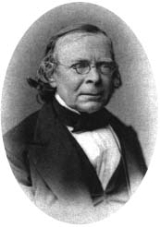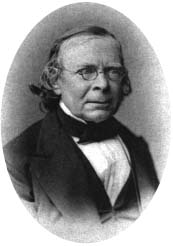
Christian August Friedrich Peters
Encyclopedia

Germany
Germany , officially the Federal Republic of Germany , is a federal parliamentary republic in Europe. The country consists of 16 states while the capital and largest city is Berlin. Germany covers an area of 357,021 km2 and has a largely temperate seasonal climate...
astronomer
Astronomer
An astronomer is a scientist who studies celestial bodies such as planets, stars and galaxies.Historically, astronomy was more concerned with the classification and description of phenomena in the sky, while astrophysics attempted to explain these phenomena and the differences between them using...
. He was the father of astronomer Carl Friedrich Wilhelm Peters.
He was born in Hamburg
Hamburg
-History:The first historic name for the city was, according to Claudius Ptolemy's reports, Treva.But the city takes its modern name, Hamburg, from the first permanent building on the site, a castle whose construction was ordered by the Emperor Charlemagne in AD 808...
and died in Kiel
Kiel
Kiel is the capital and most populous city in the northern German state of Schleswig-Holstein, with a population of 238,049 .Kiel is approximately north of Hamburg. Due to its geographic location in the north of Germany, the southeast of the Jutland peninsula, and the southwestern shore of the...
.
Peters was the son of a merchant and, although he did not attend secondary school regularly, he obtained a good knowledge of mathematics and astronomy. In 1826 he became assistant to Heinrich Christian Schumacher
Heinrich Christian Schumacher
Heinrich Christian Schumacher was a German-Danish astronomer.-Biography:He was born at Bramstedt, in Holstein, and studied at Kiel, Jena, Copenhagen, and Göttingen. In 1810, he became adjunct professor of astronomy in Copenhagen...
at Altona Observatory. Schumacher encouraged him to study astronomy and Peters did a PhD under Friedrich Bessel
Friedrich Bessel
-References:* John Frederick William Herschel, A brief notice of the life, researches, and discoveries of Friedrich Wilhelm Bessel, London: Barclay, 1847 -External links:...
at the University of Königsberg. In 1834 he became an assistant at Hamburg Observatory and in 1839 joined the staff of Pulkovo Observatory
Pulkovo Observatory
The Pulkovo Astronomical Observatory астрономи́ческая обсервато́рия Росси́йской акаде́мии нау́к), the principal astronomical observatory of the Russian Academy of Sciences, located 19 km south of Saint Petersburg on Pulkovo Heights...
. In 1849 he became professor of astronomy at Königsberg
Königsberg
Königsberg was the capital of East Prussia from the Late Middle Ages until 1945 as well as the northernmost and easternmost German city with 286,666 inhabitants . Due to the multicultural society in and around the city, there are several local names for it...
and soon after succeeded Friedrich Wilhelm Bessel as director of the observatory there. In 1854 he became director of Altona Observatory and editor of the Astronomische Nachrichten
Astronomische Nachrichten
Astronomische Nachrichten , one of the first international journals in the field of astronomy, was founded in 1821 by the German astronomer Heinrich Christian Schumacher. It claims to be the oldest astronomical journal in the world that is still being published...
. Peters edited the journal for the rest of his life, being responsible for 58 volumes of the journal. In 1872 the observatory moved to Kiel
Kiel
Kiel is the capital and most populous city in the northern German state of Schleswig-Holstein, with a population of 238,049 .Kiel is approximately north of Hamburg. Due to its geographic location in the north of Germany, the southeast of the Jutland peninsula, and the southwestern shore of the...
and he moved there and continued in his post. In 1866, he was elected a foreign member of the Royal Swedish Academy of Sciences
Royal Swedish Academy of Sciences
The Royal Swedish Academy of Sciences or Kungliga Vetenskapsakademien is one of the Royal Academies of Sweden. The Academy is an independent, non-governmental scientific organization which acts to promote the sciences, primarily the natural sciences and mathematics.The Academy was founded on 2...
.
Peters became a name in the literature on the theory of errors for his 1856 note on the estimation of precision using absolute deviations from the mean.
Peters won the Gold Medal of the Royal Astronomical Society
Gold Medal of the Royal Astronomical Society
-History:In the early years, more than one medal was often awarded in a year, but by 1833 only one medal was being awarded per year. This caused a problem when Neptune was discovered in 1846, because many felt an award should jointly be made to John Couch Adams and Urbain Le Verrier...
in 1852.
Works
- Numerus constans nutationis ex ascensionibus rectis stellae polaris in specula Dorpatensi annis 1822 ad 1838 observatis deductus. (1842)
- Resultate aus Beobachtungen des Polarsterns am Ertelschen Vertikalkreise. 1842
- Recherches sur la parallaxe des étoiles fixes. (1847)
- Über die eigene Bewegung des Sirius. Diese Schrift führte zur Entdeckung des SiriusSiriusSirius is the brightest star in the night sky. With a visual apparent magnitude of −1.46, it is almost twice as bright as Canopus, the next brightest star. The name "Sirius" is derived from the Ancient Greek: Seirios . The star has the Bayer designation Alpha Canis Majoris...
-Begleiters. Astronomische Nachrichten, 32, (1851), 1-58. - Über die Bestimmung des wahrscheinlichen Fehlers einer Beobachtung aus den Abweichungen der Beobachtungen von ihrem arithmetischen Mittel, Astronomische Nachrichten, 44, (1856). 29-32.
The articles Peters published in Astronomische Nachrichten are all available on-line.
Biography
- H. C. Freiesleben Peters, Christian August Friedrich Dictionary of Scientific Biography, vol. 10, 542-3.
External links
- Obituary (1880Obs.....3)

